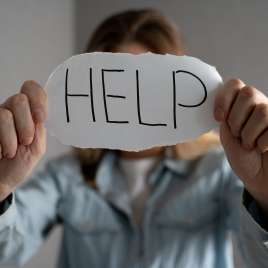Part 2: Mental Health Impacts of Sexual Assault
Experiencing sexual assault can have serious, even long-lasting impacts on mental health
Sexual assault is an experience that can have a lasting impact on a person. It’s not uncommon for people to feel like their life is at least a little bit different afterward. Sexual assault is an extremely common occurrence, disproportionately impacting women, youth, people of color, individuals with disabilities, and college students. On top of that, experiencing sexual assault can have serious impacts on mental health.
Mental Health Impacts
While sexual assault can be terrifying and awful, not every person shares the same response. Some people may feel like they were not seriously impacted by the experience and appear to have little to no impact. For others, it can be life-changing and serve as a massive point in their lives. Others might find themselves somewhere in the middle. The biggest takeaway is to not make assumptions about the person. With all of this in mind, there are a few common reactions after sexual assault takes place.
Increased anxiety symptoms
It’s common for someone to experience anxiety symptoms after experiencing sexual assault. Anxiety typically occurs after someone experiences a buildup of stress. Sometimes this looks like smaller stressful situations building up over a period. Other times, it’s one significant event. It’s important to keep in mind that in either case, experiencing anxiety can feel debilitating and exhausting. Again, not every person develops anxiety after experiencing sexual assault. For those that do, here are some signs of anxiety that could be present:
- Feeling increasingly nervous in situations that they didn’t feel before. Most of the time, this is different from what they usually feel.
- Having racing thoughts and difficulty concentrating.
- Feeling a change in mood. For some people, they typically feel more on edge than you usually do. This can look like snapping at people more than usual or having much less patience than usual.
- Feeling “wired and tired” simultaneously. This usually means feeling on edge and/or having racing thoughts, as well as feeling mentally drained. Often, People feel like they somehow are focusing on everything and nothing at the same time.
Increased symptoms of depression
Another common experience for someone to go through after experiencing sexual assault is depression. Depression is characterized by an overall elevation or lowering of someone’s mood. Often, we see this manifesting as sadness and/or despair. For some people, depression occurs after a big event or a big change. By many people’s definitions, sexual assault likely fits. While depression is very common, people can have many different symptoms. Here are some common depression symptoms that could be present after someone experiences sexual assault:
- Having a change in sleep. Some people might sleep more while others sleep less than usual.
- Noticing a change in appetite. Similar to sleep, some people may find that they’re eating more while others are eating less than usual.
- Lower energy. It’s not uncommon for someone to feel like they have decreased energy while they are feeling depressed. Many people report have such a decrease in energy that completing daily tasks feels much more difficult than before.
- Less interested in activities that they used to enjoy. This is not because they have ‘grown out’ of them by any means. Typically, this is not gradual and happens relatively quickly.
Experiencing PTSD symptoms
Posttraumatic stress disorder, or PTSD, is a mental health condition that can surface after a person experiences trauma. Often, this is scary, dangerous, or shocking to the person. Sexual assault typically is a situation that most people would describe as scary, dangerous, or shocking. However, not every person that experiences sexual assault develops PTSD. Another important consideration is that someone does not have to be in a situation where they feel like they might die. For some people, even hearing the details of a traumatic event can be the onset of developing PTSD. A qualified provider can make that determination. Some signs of PTSD include:
- Inability to focus in settings or situations. Typically, there is a marked difference between their usual level of focus and how their focus is after the incident.
- Having flashbacks of the incident. Sometimes this is while they are awake, other times it’s in the form of nightmares.
- Feeling hypervigilant more than usual. This means that they are hyperaware of their surroundings and act like there are on edge.
- Avoiding situations that remind the person of the traumatic event(s). This could be places, people, situations, or even tv shows.
- Negative thoughts or feelings that either began or got worse after the incident. This could be their overall outlook on life or isolating themselves.
- Arousal that worsened after the sexual assault occurred. This can be overall irritability or aggression, or difficulty sleeping. There are many more symptoms that fall into this category, and it will vary depending on the person.
It’s time to start therapy
If this is something you have experienced, it could be very helpful to start seeing a therapist. In therapy, our therapists can help you to regain control of your mental health. Our therapists can work with individuals who have experienced sexual assault and provide them with the resources that can help to them on their journey. Our therapists can provide in-person therapy at our St. Louis based counseling practice or through online therapy. When you’re ready to begin therapy in St. Louis, MO with our experienced and caring therapists, follow these steps:
- Schedule an appointment.
- Get to know our team of therapists.
- Feel in control again.


